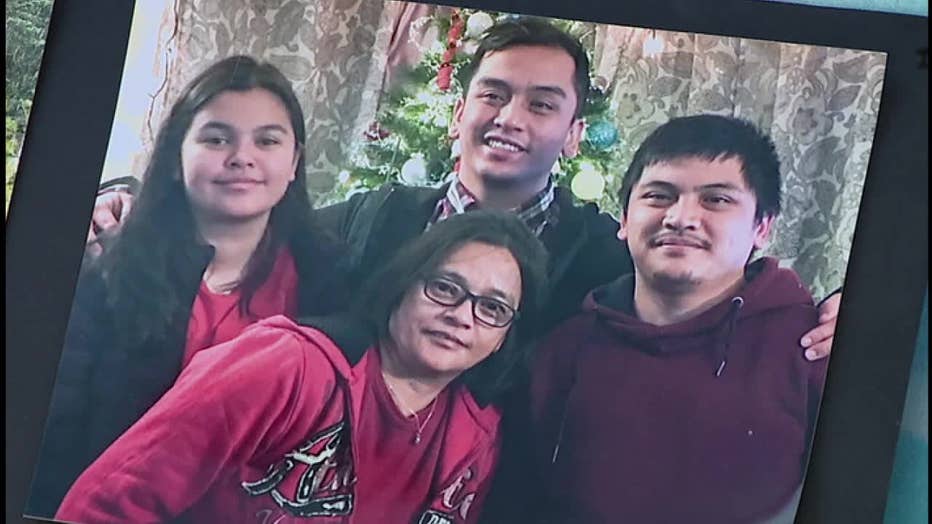Decision to clear police in Angelo Quinto's death was 'abuse of discretion:' civil rights attorneys

Decision to clear police in Angelo Quinto's death was 'abuse of discretion:' civil rights attorneys
Civil rights attorneys on Wednesday sent a letter to the state Attorney General asking him to review the death of Angelo Quinto of Antioch, saying independent autopsies show that the 30-year-old Navy veteran died of asphyxiation ? not excited delirium ? and that the fentanyl in his system was given to him by doctors at the hospital after he was already dead.
ANTIOCH, Calif. - Civil rights attorneys on Wednesday sent a letter to the state Attorney General asking him to review the death of Angelo Quinto of Antioch, saying independent autopsies show that the 30-year-old Navy veteran died of asphyxiation – not excited delirium – and that the fentanyl in his system was given to him by doctors at the hospital after he was already dead.
John Burris' law firm is requesting the state prosecutor to look at whether the Contra Costa County District Attorney's decision to not charge the Antioch police officers involved in Quinto's Dec. 23, 2020, death was an "abuse of discretion."
Attorney General Rob Bonta's spokesperson told KTVU that they will review the case, though neither the AG nor DA Diana Becton had any further comment.
"This is a really hopeful development," Quinto's stepfather, Robert Collins said at a news conference. "But we shouldn't have had to be here."
Last week, Becton said her decision to not to criminally charge the Antioch police officers involved in Quinto's death came down to this: His autopsy revealed no damage to his larynx or trachea.
The District Attorney’s Office said in a statement that it could not prove beyond a reasonable doubt that the officers acted improperly when they responded to a 911 call Quinto’s sister made, telling dispatchers her brother was acting aggressively and that she feared for the safety of her mother.
"The charging decision was outrageous," Burris' legal partner, Ben Nisenbaum told KTVU. "They're looking at the trachea. But George Floyd's trachea was never broken. The biggest strawman is that you need to see damage to the throat or neck to have an asphyxiation case. But that's just now how it works. Any competent investigator knows this."
The officers — identified as Nicholas Shipilov, Arturo Becerra, Daniel Hopwood and James Perkinson — testified at a coroner's inquest hearing that Quinto went unconscious while they were attempting to restrain him at his family’s home.

Angelo Quinto was a Navy veteran who died after an encounter with Antioch police in December 2020.
One officer kneeled and placed one knee on Quinto’s shoulder to handcuff him while the other held onto his legs. Quinto was held face down until he became unresponsive. He never regained consciousness and died in a hospital three days later. Becton noted that the use of police force to restrain Quinto was reasonable.
But Burris' law firm said that the DA "omitted relevant evidence" from its report, and failed to draw "obvious inferences" from it.
Plus, Nisenbaum and Burris took umbrage with the Contra Costa County Coroner's findings that Quinto had fentanyl and other drugs in his system.
"The District Attorney's report falsely claims that Mr. Quinto had fentanyl in his system that contributed to his death," Nisenbaum said. "The report's claim that fentanyl intoxication compounded 'the original finding of drug intoxication and further exacerbated the complications from Quinto's physical exertion before and after law enforcement arrived at the residence' is a blatant lie."
An initial drug screen at the hospital found no common drugs of abuse in his system, and medical records show that Quinto was given both Keppra and fentanyl at the hospital after he had already died, the Burris firm contends.
Burris added that the DA took the police officers accounts at face value and failed to address how it could be reasonable to conduct a prone restraint – where Quinto was held face-down for at least five minutes in handcuffs – and not consider that as a major role in Quinto's death.
A coroner’s inquest jury ruled Quinto’s death accidental after the pathologist, Dr. Ikechi Ogan, testified it was likely due to excited delirium due to drug intoxication, psychiatric conditions, physical exertion and cardiac arrest, according to the DA.
Many call "excited delirium" junk science full of racist overtones and it's a diagnosis that has been dismissed by the American Medical Association and the American Psychiatric Association.
Contradicting the county coroner's opinion, two independent medical examiners that the Burris team hired found that Quinto died by restraint asphyxia.
For now, Quinto's family is struggling to move forward. At a news conference, his mother was very emotional.
"You know justice is never easy to achieve. It is a hard road to take," Quinto's mother, Cassandra Quinto-Collins said in between tears. "But I know the truth will prevail."

The Quinto family.

